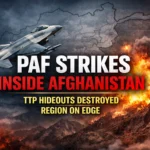A recent diplomatic exchange between Pakistan and Iran has triggered intense speculation across South Asia and beyond. During an official visit to Tehran, Prime Minister Shehbaz Sharif publicly voiced support for Iran’s right to develop nuclear energy for peaceful purposes. This coincided with the signing of a $10 billion trade agreement between the two neighbors covering energy, border commerce, and transit routes.
While no defense or nuclear agreement was signed, the symbolism was enough for Indian media outlets to brand it a “nuclear nexus”, with concerns echoing in Washington as well. The real question is: Is this the start of a genuine strategic shift—or just political theater?
India’s Perspective: Shadows of the Past
India’s sensitivity to Pakistan’s nuclear posture is deeply rooted in history. The A.Q. Khan proliferation scandal, where nuclear technology was illicitly transferred to Iran, North Korea, and Libya, remains a persistent reminder in Indian strategic thinking.
From New Delhi’s vantage point, this recent show of support raises three concerns:
-
Resurfacing Past Links – Fear of renewed nuclear cooperation, even if indirect.
-
Strategic Isolation – Closer Iran–Pakistan ties could weaken India’s regional influence and connectivity plans.
-
Broader Geopolitical Shift – Possibility of an emerging Iran–Pakistan–China alignment challenging India’s strategic space.
Even without concrete proof of nuclear cooperation today, India knows that perception often drives policy—and this perception is alarming.
Washington’s Concerns: A Potential Disruption
The United States has consistently opposed Iran’s nuclear ambitions, regardless of whether they are declared peaceful. Any diplomatic support for Tehran’s nuclear rights, especially from a nuclear-armed state like Pakistan, is viewed as:
-
Undermining U.S. containment policy in the Middle East
-
Potentially weakening sanctions enforcement
-
Signaling a drift in Pakistan’s alignment toward China, Russia, and now Iran
So far, Washington’s reaction has been measured—engaging through diplomatic backchannels rather than public confrontation—but U.S. policymakers are likely recalibrating their assessment of Islamabad’s regional role.
Separating Facts from Perception
| Claim | Reality Check |
|---|---|
| Pakistan is aiding Iran’s nuclear weapons program | ❌ No verified evidence |
| A Pakistan–Iran nuclear alliance exists | ❌ No formal agreement or operational framework |
| Pakistan’s stance legitimizes Iran’s position | ✅ Politically yes, but no operational cooperation |
| Likely to provoke India and U.S. action | ✅ Diplomatic and possibly economic pressure |
The “nuclear nexus” narrative seems more political framing than operational reality yet, in geopolitics, symbolism can be just as impactful as concrete agreements.
Why This Is Happening Now: The Geopolitical Context
Several converging factors explain the timing:
-
Iran’s growing partnership with China under the Belt and Road Initiative.
-
Pakistan’s pressing energy needs, making Iranian oil and gas supplies attractive.
-
Deepening U.S.–India defense cooperation, pushing Pakistan to strengthen ties with countries outside the U.S. orbit.
-
China’s Middle East diplomacy, which benefits from closer Iran–Pakistan cooperation.
The $10 billion trade pact is also strategically notable, aiming to bypass U.S. sanctions through barter and local currency trade an approach China, Russia, and Iran are already experimenting with.
FAQs
Q: Does Pakistan currently share nuclear technology with Iran?
No credible evidence suggests active nuclear technology transfer between Pakistan and Iran at present.
Q: Why is India concerned?
Past proliferation incidents and the fear of a strategic Iran–Pakistan–China alignment drive India’s concern.
Q: Could this lead to U.S. sanctions on Pakistan?
It’s possible if any trade or cooperation is found to violate U.S. sanctions on Iran.
Q: Is this part of China’s strategy?
Potentially. China benefits from stronger Iran–Pakistan ties as part of its regional connectivity and energy security plans.
Conclusion
At present, there is no functional Pakistan–Iran nuclear partnership—no joint program, no technology transfer, and no weaponization plans on record. But optics matter. By publicly backing Iran’s nuclear rights, Pakistan positions itself closer to Tehran at a time when Iran’s standoff with the West is intensifying.
For India, this could mean shifting regional alliances, renewed rhetoric against Western influence, and potential complications for projects like Chabahar Port. For the United States, it’s a warning sign that Pakistan’s strategic compass may be reorienting further away from Washington.
Whether this remains symbolic or evolves into something operational will depend on Iran’s nuclear trajectory—and how far Pakistan is willing to align with it beyond political statements.









